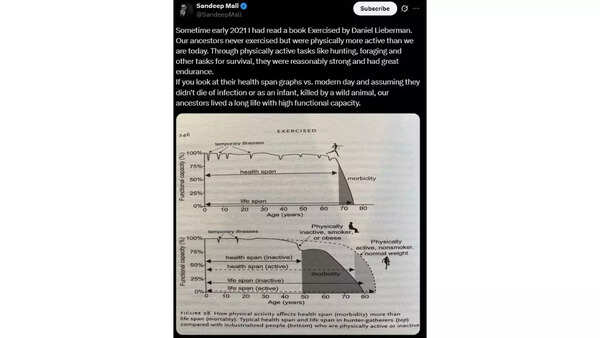Harvard research reveals: How a simple 21-minute walk a day may be healthier than hitting the treadmill
In an era dominated by intense workouts and extreme fitness goals, Dr. Daniel E. Lieberman, a Harvard evolutionary biologist, challenges conventional wisdom. He argues that our bodies are designed for energy conservation, not necessarily peak performance, and that the modern obsession with high-intensity exercise may be misguided.
Humans Evolved for Movement, Not Modern Exercise
Lieberman points out that what we consider "exercise" today is a relatively new phenomenon. Our ancestors engaged in physical activity primarily for survival – hunting, gathering, building, and migrating.
"We have to do this weird thing called exercise, which is voluntary physical activity for the sake of health and fitness – something nobody did until very recently," Lieberman explains. This suggests that while exercise is beneficial today, it's not something humans are naturally inclined to pursue without a compelling reason.
Lieberman emphasizes that humans are biologically predisposed to store energy. Our bodies evolved in environments where food was often scarce, making energy conservation a crucial survival mechanism. This explains why many people struggle with workout motivation – our bodies are wired to avoid unnecessary exertion. Pushing too hard can be draining rather than invigorating.

The Natural Workout: Walking
Lieberman advocates for walking as the most natural and evolutionarily consistent form of exercise. Early humans walked vast distances annually out of necessity. Today, walking remains a healthy, low-impact activity. Integrating walking into daily routines – taking the stairs, strolling during lunch breaks, or walking to the bus stop – aligns with our biological makeup better than extreme fitness regimens.
The 21-Minute Solution
Lieberman critiques the modern fitness mindset that equates suffering with success. He posits that moderation is more effective and sustainable. Research indicates that just 150 minutes of moderate activity per week – approximately 21 minutes a day – can reduce the risk of early death by 30%. He advises people to find enjoyable ways to move consistently, highlighting the significant benefits of small, regular habits.

The Pitfalls of Overtraining
Modern fitness trends often glorify extreme performance, but Lieberman cautions against overtraining, which can lead to injury and burnout, especially among young people pursuing unrealistic goals.
"The obsession with optimum performance is overrated," he states. "High performance is just achieving your goals and staying active – it doesn’t need to mean winning medals." He encourages a focus on function and longevity over aesthetics or performance metrics.

Is It Okay to Skip a Workout?
Lieberman’s evolutionary perspective offers a reassuring answer: yes. Since humans weren't designed for constant physical strain, rest is not a failure but a biological necessity. He advocates for balance – regular movement without obsession. Understanding our ancestors' lifestyle allows us to escape harmful fitness narratives and adopt a sustainable, guilt-free approach to health.
Dr. Lieberman’s research emphasizes a fundamental shift in how we approach movement. Exercise doesn’t need to be extreme to be effective. Consistency, moderate activity, and enjoyment are key. Walking, resting, and listening to your body might be the most natural and beneficial choices you can make.
Newer articles
Older articles
-
 Government issues warning for these Android smartphone and tablet users
Government issues warning for these Android smartphone and tablet users
-
 This new AI tool can help you book train tickets, get refunds and check details on IRCTC website and app
This new AI tool can help you book train tickets, get refunds and check details on IRCTC website and app
-
 Microsoft plans to take on iPhone and Android smartphones with this new device
Microsoft plans to take on iPhone and Android smartphones with this new device
-
 Anderson–Tendulkar Trophy: India–England Test series enters new era, tribute to cricketing legends
Anderson–Tendulkar Trophy: India–England Test series enters new era, tribute to cricketing legends
-
 Mahbub Anam replaces Faruque Ahmed as new BPL chairman
Mahbub Anam replaces Faruque Ahmed as new BPL chairman
-
 India vs England: Can Bazball outplay India's new era? Key battles and what to expect
India vs England: Can Bazball outplay India's new era? Key battles and what to expect
-
 Tait rues new-ball miss as Nissanka punishes Bangladesh
Tait rues new-ball miss as Nissanka punishes Bangladesh
-
 iQoo Z9 Turbo new leak reveals key specifications: All the details
iQoo Z9 Turbo new leak reveals key specifications: All the details
-
 Teen Innovator Soars to New Heights: Mehar Singh Breaks Guinness World Record with Lightning-Fast Drone Ascent
Teen Innovator Soars to New Heights: Mehar Singh Breaks Guinness World Record with Lightning-Fast Drone Ascent
-
 Blue light damage: 7 reasons why not using the phone can improve health
Blue light damage: 7 reasons why not using the phone can improve health